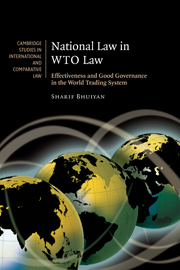Book contents
- Frontmatter
- Contents
- Acknowledgements
- List of abbreviations
- 1 Table of GATT cases
- 2 Table of WTO cases
- 3 Table of other cases
- 1 Introduction
- Part I
- Part II
- 5 The problem of characterization
- 6 Standard of review
- 7 National law as a question of fact
- 8 Mandatory and discretionary legislation
- 9 Conclusion
- References
- Index
7 - National law as a question of fact
Published online by Cambridge University Press: 23 February 2010
- Frontmatter
- Contents
- Acknowledgements
- List of abbreviations
- 1 Table of GATT cases
- 2 Table of WTO cases
- 3 Table of other cases
- 1 Introduction
- Part I
- Part II
- 5 The problem of characterization
- 6 Standard of review
- 7 National law as a question of fact
- 8 Mandatory and discretionary legislation
- 9 Conclusion
- References
- Index
Summary
Introduction
This chapter deals with two particular aspects of WTO adjudicative organs' review of national laws, namely, proof of national law and interpretation of national law. Both of these are related to the basic international law principle that national laws are facts before international courts and tribunals. The connection between proof of national law and the principle that national laws are facts is rather obvious. That is to say, because national laws are facts, judicial notice (pursuant to the maxim jura novit curia) does not apply to matters of national law. Instead, national law needs to be proved and an international tribunal will consider evidence of such law furnished by the parties, or, if necessary, may undertake its own researches. This dimension of the national law as facts principle is easily understandable and is genuinely reflected in the practice of international courts and tribunals – be it the PCIJ/ICJ, the ECHR, the WTO bodies or other international tribunals.
The issue of interpretation of national law by international courts and tribunals is less straightforward, or, to be exact, this issue has unnecessarily been shrouded in confusion. It is, of course, clearly and plainly the case that in a variety of circumstances international courts and tribunals need to interpret national laws. But despite this reality, it is sometimes suggested – as a corollary to the principle that national laws are merely facts – that an international tribunal “does not interpret national law as such.”
- Type
- Chapter
- Information
- National Law in WTO LawEffectiveness and Good Governance in the World Trading System, pp. 207 - 243Publisher: Cambridge University PressPrint publication year: 2007
- 1
- Cited by



